I’ve been asked a lot for my opinion on a recent article on whether vitamin C serums are bad for your skin. In the article, Wendy explains why Oumere will never have a vitamin C serum in their line. She outlines that vitamin C can:
- Act as a pro-oxidant when it reacts with iron in the air (or iron and copper in cosmetics) via the Fenton reaction, leading to irritation, collagen and elastin breakdown and acne
- Lead to desensitisation (tachyphylaxis) so if you start using it too young, your skin won’t respond later on
Let’s take a look at both of these arguments.
Is Vitamin C Pro-oxidant?
While in some circumstances vitamin C can act as a pro-oxidant after it reacts with metals and potentially lead to collagen destruction, vitamin C is also known to have effects that are the exact opposite:
- Vitamin C on its own is a potent antioxidant that soaks up free radicals and prevents the oxidative damage that results from UV light and other environmental stressors, as well as normal biological processes
- Vitamin C is an essential cofactor that’s required for enzymes that crosslink and stabilise collagen (prolyl and lysyl hydroxylase)
So how do we tell which of these actions, pro-oxidant or antioxidant, wins out? Science, of course! More specifically, we have quite a lot of clinical trials on vitamin C where vitamin C serums are applied to actual human skin, and its effect is measured. Vitamin C is one of THE best researched skincare ingredients.
None of the clinical trials on topical vitamin C (that’s vitamin C applied to the skin) found a decrease in collagen. In fact, a whole bunch of studies found that vitamin C increased collagen. In these studies, the volunteers were also exposed to air pollution and other cosmetic products, which were proposed to be the sources of metals that would cause a pro-oxidant effect in the article. Clearly the antioxidant effect is winning.
Related Post: Antioxidants in Skincare: What Do They Do?
Studies where vitamin C increased collagen:
- BV Nusgens et al., Stimulation of collagen biosynthesis by topically applied vitamin C (open access), Eur J Dermatol 2002, 12, 32-34.
- BV Nusgens et al., Topically applied vitamin C enhances the mRNA level of collagens I and III, their processing enzymes and tissue Inhibitor of matrix metalloproteinase 1 in the human dermis (open access), J Invest Dermatol 2001, 116, 853-859. DOI: 10.1046/j.0022-202x.2001.01362.x
- RE Fitzpatrick & EF Rostan, Double-blind, half-face study comparing topical vitamin C and vehicle for rejuvenation of photodamage (PDF link), Dermatol Surg 2002, 28, 231-236.
- M Haftek et al., Clinical, biometric and structural evaluation of the long-term effects of a topical treatment with ascorbic acid, Exp Dermatol 2008, 17, 946-952. DOI: 10.1111/j.1600-0625.2008.00732.x
Most studies on vitamin C measure its effect on photodamage. These studies generally measure the effect of vitamin C on wrinkles. While this isn’t a direct measure of collagen, lack of collagen causes deeper wrinkles, so if vitamin C was having a pro-oxidant effect you’d see a worsening of photodamage (which is actually caused partially by increased oxidation). In these studies, vitamin C improved photodamage:
- SS Traikovich, Use of topical ascorbic acid and its effects on photodamaged skin topography (PDF link), Arch Otolaryngol Head Neck Surg 1999, 125, 1091-1098.
- TH Xu et al., Split-face study of topical 23.8% L-ascorbic acid serum in treating photo-aged skin, J Drugs Dermatol 2012, 11, 51-56.
In these studies, vitamin C (and vitamin C derivatives) reduced pigmentation, which would be worsened with more oxidation:
- K Kameyama et al., Inhibitory effect of magnesium-L-ascorbyl-2-phosphate (VC-PMG) on melanogenesis in vitro and in vivo, J Am Acad Dermatol 1996, 34, 29-33.
- SW Hwang et al., Clinical efficacy of 25% L-ascorbic acid (C’ensil) in the treatment of melasma, J Cutan Med Surg 2009, 13, 74-81. DOI: 10.2310/7750.2008.07092
- ZI Shaikh & AA Mashood, Treatment of refractory melasma with combination of topical 5% magnesium ascorbyl phosphate and fluorescent pulsed light in Asian patients (PDF link), Int J Dermatol 2014, 53, 93-99. DOI: 10.1111/ijd.12195
Related Post: Vitamin C serum review: Paula’s Choice, Ultraceuticals, Ausceuticals
On a more anecdotal note, I worked on anion receptors in my PhD, and synthesised some scaffolds that bound to divalent (2+) cations like copper really well. I didn’t take any special precautions and my lab was located pretty close to the CBD, and I never had any detectable contamination from ions in air pollution, or the tap water or detergents we used for cleaning our glassware – the amounts present are really really small.
Tachyphylaxis and Tolerance and Vitamin C
What are Tachyphylaxis and Tolerance?
My PhD was in medicinal chemistry, so talking nerdy about pharmacology is my jam. I had to double check what tachyphylaxis means, and I think Wendy actually meant regular tolerance in her post. Tachyphylaxis is more commonly known as short term desensitisation, and it very rarely happens with a few drugs, where a second dose too soon after the first dose has an extremely decreased effect. Psychedelic drugs are a common example – a dose of LSD the day after the first dose won’t cause the user to “trip”. To get the same effects as the first day, there needs to be a break of a week or so or the dose needs to be increased massively.
Regular tolerance is when your body responds far less to a medication or drug after a while. For example, if you take antihistamines long-term, you may gradually need to take more to get the same effect. Caffeine in your coffee also works like this – when you start you might only need one coffee to perk up, but after a few weeks you can handle 4 coffees and you’re still half-asleep by mid-afternoon.
Related Post: Are unsaturated oils bad for your skin?
Tolerance can also be beneficial. For example, snake handlers are sometimes exposed to increasing amounts of snake poison until they can survive otherwise lethal quantities of snake poison in case they’re bitten in their line of work. We also use tolerance when we “get used” to treatments like retinoids – you slowly introduce the product, and your skin gets more tolerant to the dryness and irritation effects (but not to the beneficial anti-inflammatory, clog-clearing effects).
But tolerance doesn’t happen with all drugs. For example, the common over-the-counter painkiller paracetamol (also called acetaminophen, sold as Panadol and Tylenol) doesn’t cause tolerance, so you can take it regularly for very long periods of time and it’ll still keep working the same. You also don’t develop tolerance to benzoyl peroxide in acne treatments.
Is Tolerance to Vitamin C Likely?
The way tolerance builds is generally to do with a decrease in the sensitivity of the receptors that recognise the substance and cause the response, or a decrease in the number of receptors. For orally administered drugs, it can also involve the liver’s metabolic pathways.
There’s no evidence to suggest that we build a tolerance to vitamin C. I’d argue that it’s unlikely since its mechanisms of action (as far as we know) don’t involve receptors.
- Antioxidant effects: Vitamin C interacts directly with free radicals, quenching their unpaired electrons.
- Collagen-building: It’s hypothesised that the collagen-building effects are to do with insufficient vitamin C for collagen enzymes, so topical vitamin C just supplements what’s already present.
- Antipigmentation: Vitamin C interacts with copper ions at the tyrosinase-active site and stops it from working, so again, no receptors.
Related Post: Easy (5 Minute) DIY Vitamin C Serum Recipe
If Tolerance Occurs… So What?
But let’s say tachyphylaxis or tolerance does happen – this still isn’t a problem! Even when tachyphylaxis and tolerance occur, it reverses once you stop taking it for a while, and smaller doses will be more potent again. Tachyphylaxis from psychedelic drugs pretty much resets after a break of a week. Caffeine tolerance resets in around a week of going cold turkey as well.
A short break will be enough to undo any potential vitamin C tolerance, so you don’t need to worry that “using a vitamin C serum too early in one’s life will make your body less inclined to have the positive skin benefits later on when you really need it.”
There are a few examples of drugs that will lower tolerance for a longer time (years) like amphetamines, but this is because amphetamines actually kill off the brain cells on which they act since they’re neurotoxic. But even that will usually reset after a year or so – and there’s no evidence that vitamin C kills any cells.
(It’s also possible to have a dose that doesn’t cause increased tolerance, so you can use this amount continually and still see the same benefits for long periods of time. Most people will eventually find the right plateau with their daily coffee hit.)
Verdict
Vitamin C is not a gimmick or detrimental to your skin – we have lots of clinical trials to support this. There are lots of theoretical reasons why vitamin C could potentially be bad for your skin. But there are also lots of theoretical reasons why vitamin C could be good for your skin too, and in practice the benefits far outweigh any detrimental effects.
It’s unlikely that vitamin C causes tolerance, and even if it does, it’s almost definitely going to be very easily reversed with a few weeks’ break.
Additional Note
This is actually a really good illustration of why theoretical mechanisms are well and good, but we still need clinical evidence. What happens in a test tube, or a cell line, or an animal study, may not happen when you apply a product on your skin, because biological systems are complex and lots of other effects can occur at the same time and outweigh a single effect. In the absence of better data we’re forced to rely on theoretical mechanisms and analogies, but data from experiments that are close to the real life situation will always overrule these hypotheses.
It’s the same story with a lot of other ingredients in cosmetic products like sunscreens, which could theoretically cause more cancer because of decreased vitamin D, but actually prevents more cancer. Even sugar is a bit like this: it could theoretically make you lose weight since your body uses energy to digest it, and it absorbs water so it could potentially act as a laxative, but actually makes you gain weight because it’s metabolised to produce energy and absorbed well before it reaches the large intestine.
References
BV Nusgens et al., Stimulation of collagen biosynthesis by topically applied vitamin C (open access), Eur J Dermatol 2002, 12, 32-34.
BV Nusgens et al., Topically applied vitamin C enhances the mRNA level of collagens I and III, their processing enzymes and tissue Inhibitor of matrix metalloproteinase 1 in the human dermis (open access), J Invest Dermatol 2001, 116, 853-859. DOI: 10.1046/j.0022-202x.2001.01362.x
RE Fitzpatrick & EF Rostan, Double-blind, half-face study comparing topical vitamin C and vehicle for rejuvenation of photodamage (PDF link), Dermatol Surg 2002, 28, 231-236.
M Haftek et al., Clinical, biometric and structural evaluation of the long-term effects of a topical treatment with ascorbic acid, Exp Dermatol 2008, 17, 946-952. DOI: 10.1111/j.1600-0625.2008.00732.x
SS Traikovich, Use of topical ascorbic acid and its effects on photodamaged skin topography (PDF link), Arch Otolaryngol Head Neck Surg 1999, 125, 1091-1098.
TH Xu et al., Split-face study of topical 23.8% L-ascorbic acid serum in treating photo-aged skin, J Drugs Dermatol 2012, 11, 51-56.
K Kameyama et al., Inhibitory effect of magnesium-L-ascorbyl-2-phosphate (VC-PMG) on melanogenesis in vitro and in vivo, J Am Acad Dermatol 1996, 34, 29-33.
SW Hwang et al., Clinical efficacy of 25% L-ascorbic acid (C’ensil) in the treatment of melasma, J Cutan Med Surg 2009, 13, 74-81. DOI: 10.2310/7750.2008.07092
ZI Shaikh & AA Mashood, Treatment of refractory melasma with combination of topical 5% magnesium ascorbyl phosphate and fluorescent pulsed light in Asian patients (PDF link), Int J Dermatol 2014, 53, 93-99. DOI: 10.1111/ijd.12195
BALESTRIERI AFONTANARI D. Acquired and Crossed Tolerance to Mescaline, LSD-25, and BOL-148. AMA Arch Gen Psychiatry. 1959;1(3):279–282. doi:10.1001/archpsyc.1959.03590030063008
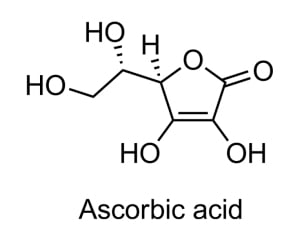





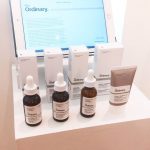
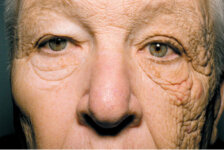
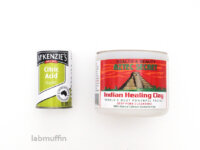
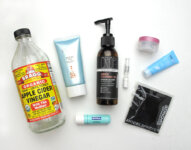
Your article appeared on my computer immediately after I had applied my vitamin C serum. Thank you for explaining the science and the real-world impacts. There is so much great information on the internet, as well as so much that is misleading. We really need your expertise and your ability to make facts clear in language that we laypersons can understand. So happy I found your website all those years ago! Thank you again!
Thanks so much for your kind comments! <3
Hi there. Could you please write anything about microneedling? This OUMER owner said that microneedling is damaging your skin and accelerate aging. Sad is, she is talking about a dermaroller in 2019 and never heard about dermapen. Thank you.
Thanks for breaking this down for us! I have used Timeless for years. I never completely use up a bottle because I’m always worried it goes bad before 3 months is up and I’m terrible about keeping it refrigerated. I’m thinking of switching over to a vitamin C like the Ordinary. Is the network antioxidant effect of the C+E ferulic a big enough advantage to replace it more frequently?
C+E+Ferulic should be good for a longer time than 3 months, but anhydrous is probably more stable (but more irritating). I personally don’t like to have to worry about oxidation so I go for anhydrous (in my case, DIY).
Thanks! I might try the DIY you posted a while back. I found the anhydrous SO irritating. I’ve left the lid off my Timeless and have generally been bad about keeping it in a dark place. It’s probably oxidized a bit more than it should.
Great article with refreshingly factual information that sets the record straight, Michelle! Your post is so timely; a Facebook group I’m in was discussing the original article just yesterday. I’m going to share a link to your piece with everyone there.
I’m so glad you liked it! I hope it clears things up 🙂
I hadn’t heard about possible detrimental effects of Vitamin C and wouldn’t have believed it. Thank you for doing the research for us!
What about the instability of vitamin C + water? Is it real? Should we use powdered vitamin c? Love your blog! Kisses from Brazil
It’s real – I discuss it in my DIY vitamin C serum recipe post. It can be slowed down with antioxidants.
>we have quite a lot of clinical trials on vitamin C
But the question is, what kind of formulations do they use in these studies and how fresh are they. A product that has been stored for weeks in a warehouse and did have long shipping times, do they still work.
Another problem could be that in those studies often one product is used, but what is the influence of applying multiple products at the same time, like a copper peptide, niacinamide serum or physical sunscreen on the stability of vitamin C. Physical sunscreens often contain iron oxides, and small amounts of Zn ions can be released from the formula, this will interact with the ascorbic acid molecule.
I do think we still need more information about the stability of the common vitamin C serum we buy in store. Of course we can make a guess based on the available studies, but to really know for sure how stable a formula is, and if a formula really penetrates you need to test it. Drunk Elephant which turns brown very quickly, TO which is in a silicone base, small alterations to a formula can result in a different effect on skin. I’ve never seen cosmetic company share a stability study on a vitamin C serum, but I have spoken to cosmetic chemists saying it is almost impossible to formulate a water based vitamin C serum if it isn’t used fresh. Hopefully there will be more information on specific formulas, although cosmetic companies will never share anything negative about their own product unfortunately…
I’ve provided the links to the studies so you can check out their methods for yourself – a lot of them are open access. I doubt that the use of foundation and sunscreen were excluded from those studies.
I’ve actually been hearing the opposite about vitamin C stability in aqueous formulations from cosmetic chemists lately – apparently it’s pretty easily to stabilise vitamin C if you just pile on the antioxidants, a la Skinceuticals’ C E Ferulic, but probably not the ones they use because of the patent. There are also plenty of anhydrous formulas now in silicone which would be highly stable, and pure LAA powder.
Great post! Thanks again for doing the research and breaking it down into easily digestible information! 🙂
Not sure if you’ve already covered this, but I’ve heard that Vit C used under sunscreen makes them more effective, but recently I’ve been hearing the opposite, that it actually decreases the efficiency of the sunscreen. It’d be great if you could look into this (if you haven’t already).
Great information, thank you!
I noticed what I thought might be a tolerance to my Vit C serum, so I stopped using it for about 2 weeks and saw the brighter more vibrant skin when I used it again. I was confused as to whether this was true tolerance or rather that it was keeping my skin at an optimal level of benefit and thus, when I stopped using it, my skin had regressed to it’s pre-Vit C state and hence the improvement when I did the re-challenge. After reading this, I’m inclined to think the latter. I purchased some Vit C powder to mix into skincare but it was irritating to my skin so I went back to my expensive (sigh) serum.
Complex stuff, thanks for making it easily understandable for us!
I’d think the latter too! The best way to check would be good before and after photos I think.
I’m loving this site. So impressed with the quality of research and presentation.thank you!
Thank you!
Thank you so much for this insightful article. You have convinced me to get a Vitamin C serum! I was looking at one by Paula’s Choice (Resist C15 Super Booster), and I noticed that it comes in a dropper instead of an airless pump. Will this affect the shelf life of the serum?
Thank you Michelle! So happy to have found your site. I love how you explain science in such a clear and relateable way.
great post!! I love your blog, it has been such an inspiration!! I recently started a science blog of my own, on the chemistry of everyday life like skin care and food. I’d love to chat sometime! 🙂
That’s fantastic to hear! I’ll have to check it out 🙂
Hello Michelle,
Great article, thank you! I did not think about it before but maybe it is better to refrain from using copper peptides and vitamin C at the same time?
Thank you 🙂
Zoé
I think the risk of a dangerous reaction is low but it wouldn’t hurt to stay on the safe side!
Thanks Michelle for such an informative post. I am also a PhD student in Chemistry so reading your post inspires me a lot haha. I just purchased the “Refresh Skin Therapy Vitamin C Serum” on Costco and used it for a day then I read your post. I am a little skeptical about using it now. I wonder when/ what age should I start using it? I am 23 years old now and I have sensitive and blemish- prone skin (link below). Also, I want to work in the cosmetic industry after finishing up my degree. Any advice for me haha? Thanks!!
https://www.costco.com/Refresh-Skin-Therapy-Vitamin-C-Serum.product.100387436.html
You can start using it whenever!
I’m not in the cosmetics industry so unfortunately I can’t help you with that… but maybe look for the cosmetic chemist society in your region and start networking 😉
I just recently discovered your blog and channel and holy hell, thank you! I am so glad to have found someone who emphasizes a science-based approach to skincare instead of, “I slapped peanut butter on my face and it cured my acne. You should do it, too!” Thank you so much for everything you’re doing.
I have a question I hope you can shed some light on.
I used a DIY c serum years ago and loved the brightening effects and how it faded my post-acne pigmentation issues, but it was incredibly irritating after more than a few days of use. (I was making a 10% solution, same recipe as yours.) I read before that LAA is still present on the skin after 72 hours. Is this true? And if so, does this mean I could still enjoy the benefits of vitamin c (with presumably less irritation) if I apply it every third day?
Thank you so much! <3
Applying some is better than none! You can also try a lower concentration, or using an anti-irritant product in combination with it, or applying a rich moisturiser on top.
Hi Michelle, I’ve been using a product called Truskin C with 20% vitamin C in the form of sodium ascorbyl phosphate. My skin has turned a little yellow, and it doesn’t come off when washed, so stained yellow. I’ve read that this is a rare adverse reaction to vitamin C. ??? It’s driving me crazy since I really want the benefits of C, but instead of reducing hyperpigmentation from acne and mild post pregnancy melasma, it’s making matters worse. I currently use it in the daytime, followed by sunscreen, of course. Would it be better to use it at night? Should I quit using it all together? Any advice would be appreciated!
And I love your blog. It’s so nice to have such great information. I no longer just put anything trendy on my face, haha, but know to research first. Thanks!
I have been starting and stopping my use of the Ordinary Ascorbic acid 8% + Alpha Arbutin 2% for about 3 months because each time I use it I see little red bumps appear on my skin. I went from applying it every day to every other day and then twice a week but the bumps always reappear. I hate wasting product, but I’m at the point of throwing in the towel on vitamin C. Maybe another brand or formulation might work better. Or do some people just get irritated by it no matter what?
Not Michelle, don’t have her qualifications, but people can be sensitive to the ingredient and/or can experience irritation if a product containing it in measurable quantities is mis-used, isn’t well-formulated, or has other ingredients that clash with your skin and/or the rest of your skincare regimen. You can try tweaking the regimen to reduce the risk of that kind of interaction (or narrow down what product doesn’t play well with that formulation) or alter when you’re using it.
If all else fails, you can patch-test it on a less sensitive area of skin that could benefit from vit C and, if that proves to have no negative results, use the remainder of the bottle there. Just use sunscreen when applying it during the day. This is what I do when a product has failed my face; it goes on my chest or arms.
That’s good advice. Thanks.
Thank you THANK YOU for explaining everything so clearly! I’ve been following you for a while but wanted to finally express my appreciation for all the research and effort you put behind every post. I can rest easy knowing that your opinions are backed by logic and science; we need more people like you in this world 🙂
Great post Michelle though I’m wondering if you saw this additional post by Oumere that directly discusses their problems with the Vitamin C research?
https://www.oumere.com/blogs/news/the-scientific-papers-supporting-vitamin-c-serums-skin-benefits-are-flawed
I’d be interested to see a rebuttal on your blog here or some discussion about their differing interpretation.
Cheers.
I dont think Michelle needs to. Seeking flaws in others (the studies) doesnt make her arguments more valid, especially given the number, of flaws and fallacies, in her original post.
For example:
“And let’s say you have been using a vitamin C serum to promote collagen (when your body is already naturally doing it on its own) for 20 years, you’re 45-50 years old and your body is not producing collagen any more. Do you really think that skin care is going to have any effect now?”
By her account we wont be producing collagen after 45, wait what does that have to do with tachyphylaxis? If we wont be producing collagen after 45, why wouldn’t skin care have any effect? If we won’t be producing collagen by 45, doesn’t it make more sense that we produce more collagens now so we will have a huge reserve by the time we reach 45?
Thank you for sharing your thoughts.
Hi Michelle!
I cannot tell you how happy I am to have found this article- I read the Oumere article and I was freaking out!!!!
So relieved since I’ve been happily using my Vit C to fade my acne hyperpigmentation.
Every now and again (say if i go on holiday for a short period) I like to simplify my routine and leave out an active or two before I re-introduce and I find that that helps with tolerance.
Just to be clear- I’m in my early 20s and I’m using tretinoin for acne- I should be fine right? Its definitely not true that I won’t have any collagen left in later life right? Because those are some crazy claims!!!
Thank you sosososo much for your research- I think its scary how others are able to so convincingly say things and because theres a fancy term or a diagram used, it seems so much more believable!
Same here. I would always trust a clinical trial over hypotheses as they are already proven to work. Vitamin C for the win!
Thank you for ‘debunking’ that Oumere article with science!
Regarding the possibility of vitamin C reacting with metals to become pro-oxidant, is this made more or less likely if you use mineral-based sunscreens (e.g. zinc oxide & titanium dioxide)?
Many thanks!
Hi Michelle! Boy, do I appreciate this post. Thank you! You’re a ray of sunshine in the dark really 🙂 I’ve just discovered Wendy’s blog and found some controversial opinions in there and I was really wondering if there may be some basis to them. She does manage to seem convincing to the average layperson who has moderately dabbled into skincare. She also has some contrarian thoughts on the long term use of tretinoin, benzoyl peroxide and claims hyaluronic acid is not good at all, ever 🙂 I was wondering if you have the patience to look into those as well and maybe write a post. Might be fun 🙂 Thanks a bunch!